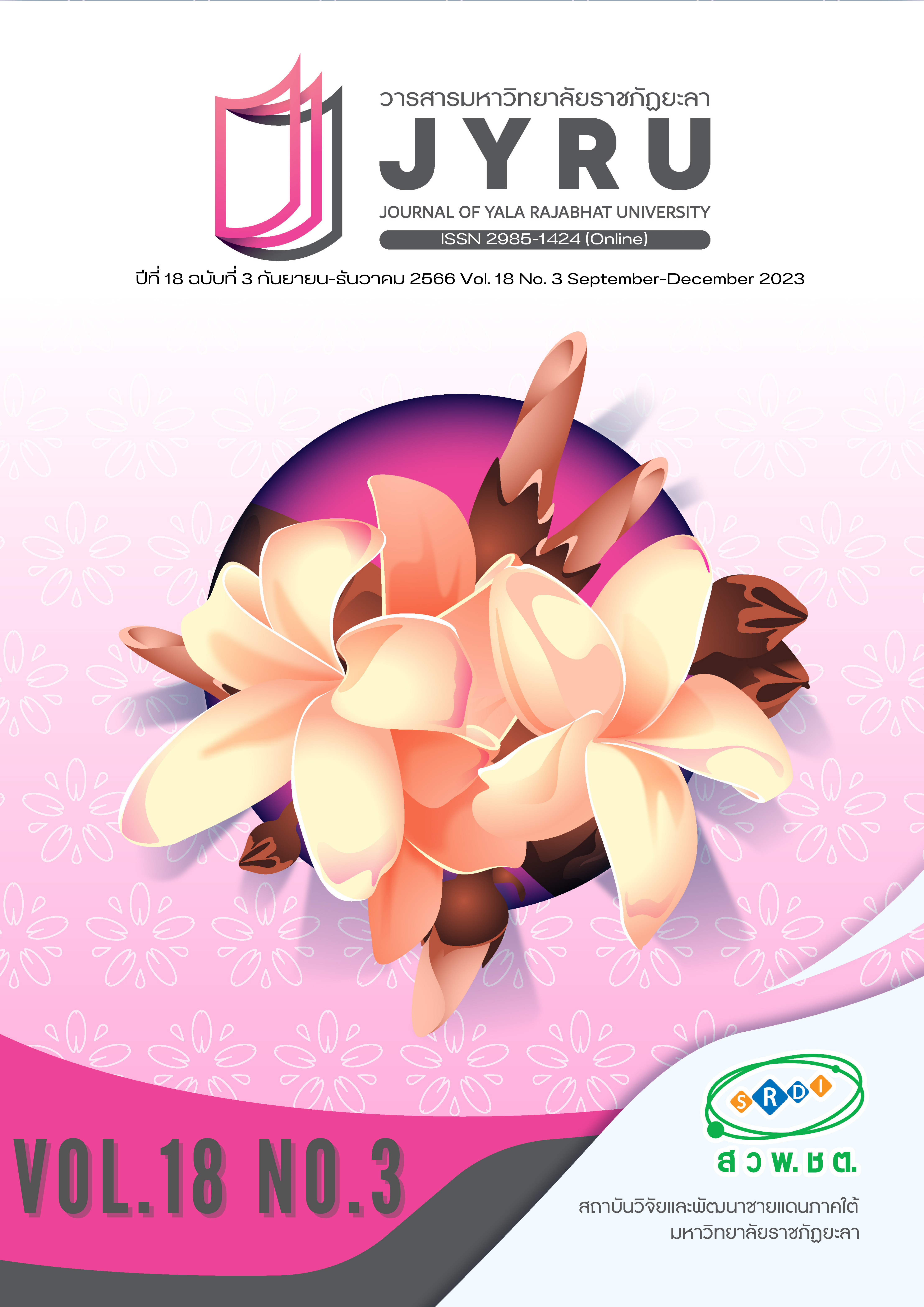การยกระดับเศรษฐกิจและสังคมรายตำบลแบบบูรณาการสู่แนวทางการขยายผลการพัฒนา จังหวัดยะลา
Main Article Content
บทคัดย่อ
เศรษฐกิจรากหญ้ามีความสำคัญในการพัฒนาสังคมให้ยั่งยืน การวิจัยครั้งนี้ มีวัตถุประสงค์เพื่อศึกษาปัจจัยที่มีผลต่อความสำเร็จ วิเคราะห์และประเมินผลความสำเร็จ ปัญหาอุปสรรคที่ส่งผลกระทบต่อความสำเร็จในการดำเนินโครงการยกระดับเศรษฐกิจและสังคมรายตำบลแบบบูรณาการจังหวัดยะลา โดยศึกษาจากผู้ที่เกี่ยวข้องกับโครงการมหาวิทยาลัยสู่ตำบลสร้างรากแก้วให้ประเทศ โดยใช้กระบวนการวิจัยแบบผสม ซึ่งเป็นการเก็บข้อมูลทั้งเชิงปริมาณและคุณภาพ ในลักษณะแบบแผนแบบคู่ขนาน เชื่อมโยงข้อมูลทั้งสองลักษณะไปด้วยกัน ผลการศึกษาพบว่า ปัจจัยที่ส่งผลต่อความสำเร็จของโครงการฯ ได้แก่ ความรู้ความเข้าใจของผู้เข้าร่วมโครงการ งบประมาณที่ได้รับการสนับสนุน ทรัพยากรที่มีอยู่ในชุมชน/โครงการ และบทบาทของภาคีเครือข่ายการพัฒนา ผลการประเมินตัวชี้วัดความสำเร็จ ได้แก่ 1) ความสำเร็จในการพัฒนาสัมมาชีพและสร้างอาชีพใหม่ 2) ความสำเร็จในการสร้างและพัฒนายกระดับเศรษฐกิจของชุมชนและพื้นที่ 3) ความสำเร็จในการนำองค์ความรู้ไปช่วยบริการชุมชน และ 4) ความสำเร็จในการส่งเสริมด้านสิ่งแวดล้อม และการเพิ่มรายได้หมุนเวียนให้แก่ชุมชน เป็นไปตามวัตถุประสงค์ของหน่วยงาน นั่นคือ มีความสำเร็จอยู่ในระดับมากทุกตัวชี้วัด และสอดคล้องกันกับการวิเคราะห์เชิงปริมาณ สำหรับปัญหาที่พบมากที่สุด คือ ระยะเวลาของการดำเนินโครงการน้อยเกินไป ข้อเสนอแนะควรให้มี การขยายเวลาในการดำเนินโครงการออกไป เพื่อความต่อเนื่องในการพัฒนา สำหรับแนวทางในการขยายผลนั้น ควรนำเอาปัจจัยที่ส่งผลต่อความสำเร็จของโครงการปรับใช้กับการขยายผลในชุมชนอื่น ๆ และพื้นที่อื่น ๆ ที่มีความคล้ายคลึงกัน
Article Details

อนุญาตภายใต้เงื่อนไข Creative Commons Attribution-NonCommercial-NoDerivatives 4.0 International License.
บทความ ข้อมูล เนื้อหา รูปภาพ ฯลฯ ที่ได้รับการเผยแพร่ในวารสารมหาวิทยาลัยราชภัฏยะลานี้ ถือเป็นลิขสิทธิ์ของวารสารมหาวิทยาลัยราชภัฏยะลา หากบุคคลหรือหน่วยงานใดต้องการนำทั้งหมดหรือส่วนหนึ่งส่วนใดไปเผยแพร่ต่อหรือกระทำการใดๆ จะต้องได้รับอนุญาตเป็นลายลักษณ์อักษรจากวารสารมหาวิทยาลัยราชภัฏยะลาก่อนเท่านั้น
เอกสารอ้างอิง
Bloom, B. S., Madaus, G. F. & Hastings, J. T., et al. (1971). Handbook on formative and summative evaluation of student learning. New York: McGraw-Hill.
Bootkhamchot, R. (2017). Success factors of debt management to be 1 household – 1 contract community fund management center, community development center. Master Degree’s Independent Studies (Public Administration and Public Affairs), Executive Program in Public Administration and Public Affairs, Thammasat University. (in Thai)
Boonwises, S. (2022). Results-based management [Online]. Retrieved on June 15, 2022, from: http://med. swu.ac.th › msmc › images › news2. (in Thai)
Chaisrisuth, A. & Songklin, P. (2022). Problems and obstacles in implementing of the promotion of supplementary occupations project under Her Royal Initiatives in Silalad district, Srisaket province. Journal of Roi Et Rajabhat University, 14(1), 84-97. (in Thai)
Davis, J. (2017). Two awesome hours: science-based strategies to harness your best time and get your most important work done. San Francisco: Harper One.
Davis, K. (2014). Different stakeholder groups and their perceptions of project success. International Journal of Project Management, 32, 189–201.
Jaisue, N. (2018). Factors affecting the success of sufficiency economy community of Salasak and Ban Koko. Sutthiparithat, 30(96), 108-119. (in Thai)
Klangphahol, K. (2020). Mixed methods research. Journal of Graduate Studies Valaya Alongkorn Rajabhat University, 14(1), 235-256. (in Thai)
Likert, R. (1967). The method of constructing and attitude scale. Attitude theory and measurement. New York: Wiley & Son.
McClelland, D. C. (1953). The achievement motive. New York: Appleton-Century Crofts, Inc.
Office of the Permanent Secretary, Ministry of Higher Education. (2022). Lesson-learned from the integrated subdistrict economic and social enhancement project (1 subdistrict 1 university). Bangkok: Ministry of Higher Education, Science, Research and Innovation. (in Thai)
Onyaem, W. (2019). The success factors and problems in the project management at Mahidol University International College. Journal of Professional Routine to Research, 6(6), 1-8. (in Thai)
Phanomket, P., Vajee, P. & Thammasit, P. (2021). Factors affecting the success of informal education administration of non-formal and informal education office, Uttaradit province. Journal of Roi Kaensarn Academi, 6(7), 76-87. (in Thai)
Potisawang, P. (2013). Doing social research: principles, methods and statistics and computer. Chonburi: Come In. (in Thai)
Phromma, W. (2021). The organizational success [Online]. Retrieved on April 5, 2021, from: https://www.goto know.org/posts/105895 (in Thai)
Punyayuttakarn, P. (2022). Project success factors [Online]. Retrieved on June 15, 2022, From: https://www. knowledgertraining.com/index.php?tpid=0032. (in Thai)
Rungrut, S. (2017). The origin of million Zebra Dove in Thailand. Journal of Yala Rajabhat University, 12(2), 153-166. (in Thai)
Treenet, S. (2014). Development of examplenery village on sufficiency econaneriy: a case study of Wangsaengtai Village District, Khon Kaen Province. In Proceeding of the 4th Conference on Social Development for Sustainability 2014, 4(1), 171-176. (in Thai)
Yamane, T. (1973). Statistics: an introductory analysis. New York: Harper & Row.
Yokee, M. & Sahapattana, P. (2021). Policy successes and failures: “waterside housing development project”. NRRU Community Research Journal, 15(4), 13-27. (in Thai)


